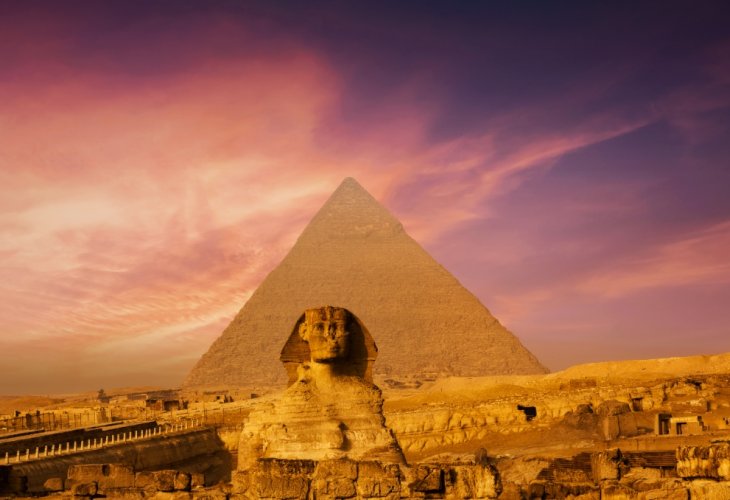Faith
The Surprising Torah Command to Respect Egyptians
Exploring the biblical lesson of gratitude and moral integrity, even toward those who once oppressed us
 (Photo: shutterstock)
(Photo: shutterstock)Anat asks: "Hello, I saw a lecture on gratitude, and it said that you should show gratitude to someone who helped you – even if they didn’t mean to help! The proof given was that the Torah commands, ‘Do not despise an Egyptian because you were a stranger in his land,’ since the Egyptians still served as a lodging for us. How can the Torah command us to be grateful to the Egyptians after they drowned our sons in the Nile, abused us, and caused so much suffering to the Jewish people? To me this sounds like forgiving the Nazis, may their name be blotted out."
* * *
Hello Anat, and thank you for your question.
The Torah says: “Do not despise an Edomite, for he is your brother. Do not despise an Egyptian, because you were a stranger in his land” (Deuteronomy 23:8).
Rashi explains: “Do not despise an Edomite completely, even though you have reason to despise him for coming out against you with the sword; do not despise an Egyptian completely, even though they drowned your male children in the Nile. Why? Because they served as your lodging in your time of distress.”
From here we learn the trait of gratitude, as the Sifri (117) states: “Rabbi Elazar ben Azariah said: The Egyptians did not accept Israel except for their own needs, yet God still fixed a reward for them. This is a kal vachomer (deductive reasoning): If one who did not intend to merit still merited and the Torah counts it as if he merited, then how much more so one who intended to merit!”
In Joseph’s time, Pharaoh honored him, elevated him to greatness, and gave Jacob and his sons residence in Egypt during the years of famine and beyond. The Egyptians treated the Israelites well then, only because Joseph had benefited them through his wisdom and saved them from starvation. Still, this kindness – however self-serving – is remembered. Only in a later generation did the Egyptians “change their skin” and oppress the Israelites with forced labor. That later cruelty cannot erase the initial good, and so the Torah forbids us to despise an Egyptian.
Understand that to despise is stronger than ordinary hatred. Regarding interpersonal hatred, the Torah says: “Do not hate your brother in your heart” (Leviticus 19:17). Ramban explains: “Because the way of those who hate is to hide their hatred in their heart.” Hatred is often internal; despising implies active hatred – withholding good, seeking to harm.
We are not required to love the Egyptians, but we are commanded not to despise them. This is expressed in a Torah law: It is forbidden to permanently bar an Egyptian convert after three generations (Sefer HaChinuch, mitzvah 564).
Further, we believe wholeheartedly that everything that happens to the Jewish people is decreed by God. As our Talmudic Sages taught, “The Holy One does not bring punishment except through the guilty” (Taanit 29a). The Talmud (Taanit 18b) relates that when the Roman official Trajan sought to kill two Jewish brothers, they said to him: “We are already sentenced to death by Heaven. If you don’t kill us, the Holy One has many executioners – lions, bears – to kill us.”
The same is true for the Nazis, may their name be erased. They were merely the instruments of evil; had they not chosen that role, another nation would have arisen against us at that time.
This can be understood with the following parable: A man owns a dog that turns aggressive, despite being fed and cared for. The owner uses a stick to discipline it, but the dog foolishly attacks the stick, not realizing the hand behind it. In the same way, we often rage at our human enemies without seeing the Divine hand using them as a wake-up call. If we repent, the enemies lose their power over us.
Throughout history our persecutors have changed – Arabs today, Germans less than a century ago, Crusaders, Romans, Greeks, Persians, Egyptians – yet the pattern reveals God’s hand guiding history to teach us our purpose. Despite decrees and exiles, we have survived for 3,300 years, outlasting all those mighty empires.
True believers don’t harbor hatred as a personal vendetta. We seek justice against Israel’s enemies to sanctify God’s name and protect our people, but we recognize that the ultimate source is Heaven. The Torah teaches when to hate and when not to.
The Egyptians who abused us got their full punishment through the Ten Plagues and the drowning at the Red Sea. Now that they’ve been repaid, our Torah teaches us to release the hatred, especially since the Egypt of today is not the Egypt of old. Ancient Egypt’s empire vanished; modern Egyptians are Arabs, not descendants of Pharaoh’s people.
Similarly, modern Germans are not the Nazi regime. Germany today maintains peace with Israel, supports Holocaust survivors, memorializes the Shoah, and jails Holocaust deniers. They are not our current threat; the Torah’s lesson about Egyptians could apply here – after the evil regime is gone and justice is done, the hatred is not an eternal command.
By contrast, the Torah commands never to forget Amalek, because Amalek’s ideology – to attack the weak, deny God, and destroy Israel, still reappears in different forms and peoples throughout history. Amalek can be any nation or movement that embodies that mission. As Rambam teaches, even an Amalekite who sincerely repents and accepts the Seven Noahide Laws loses the name “Amalek” and is no longer targeted.
“Do not despise an Egyptian” applies after their chapter has closed in history and their descendants no longer carry that role. We remember the good they once did – however small – as a lesson in gratitude, even toward those who later became enemies.

